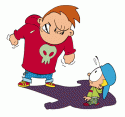The Science of Bullying

You have seen bullies in action. You may have been on the receiving end, or maybe you yourself were the bully. We all know it happens, and how awful it can be. The real question is why it happens. It is important to remember that no two bullies are the same. It is even harder to remember that bullies are human too.
Studies have shown a myriad of causes for bullying behavior. The bully may be redirecting the pains of a troubled family life or struggles in the classroom towards other students. Bullies might be trying to appear “cool” in front of their peers. They may have seen others get their way through bullying, and prey on individuals who appear weaker to gain control. In all these cases, a bully is someone in need of something and not getting it. There is an emotional void that they are trying desperately to fill, and in that desperation they are going about it in an extremely harmful way.
This is important to remember, especially as a victim of bullying. It is far too easy to view the aggressor as a monster, as someone lacking in empathy and humanity. Adults do this too; simply take a look at any wartime propaganda to see how the opposition can be made to look like inhuman monsters. It is human nature to create a story-like quality to our everyday lives, to classify ourselves as the heroes and designate the villain role to someone else. The bully might be your villain, but in their life story they may see themselves as the tragic hero up against abusive parents or teachers.
Victims of bullying deal with depression and self-esteem issues. They often struggle to find a sense of normalcy in their adulthood. Bullies are more likely to become dependent on drugs and alcohol as they grow older, or continue their habit of abusive behavior well into adulthood. It is in the best interest of both the bully and the victim to put a stop to the behavior. If you or someone you know is being bullied, some people will tell you to go to an adult. Others will say to fight back. What is the best course of action?
Unfortunately, just like how no two bullies are alike, no two life stories are alike. There is no one-size-fits-all solution. If you are going to tell an adult, make sure it is someone you trust and who you believe will take strong action. Fighting back might be tempting, but it can lead to an escalation in violence that would make it hard to tell the bully and victim apart.
However, doing something is far better than doing nothing. Reach out to a teacher, parent, or adult you admire. If they have earned your admiration, then they have the character and intelligence to take proper action. Ultimately, this will save the lives of all the victims – both the bullied and the bully, for maybe, years to come.
Sources:
eSchooltoday. Why do some people bully others?
http://eschooltoday.com/bullying/Why-do-people-bully.html





Leave a comment!